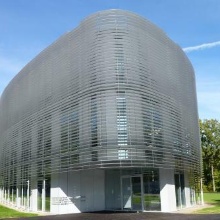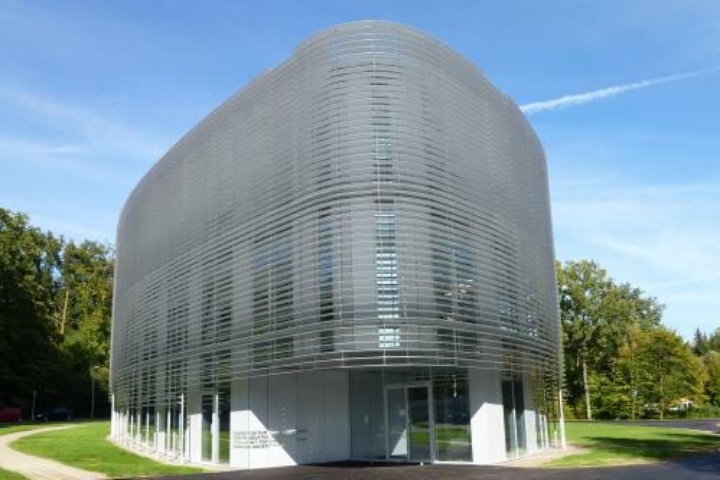After a two-year construction period, a research centre on the campus of the University of Stuttgart was handed over on Wednesday, 26th October 2011, setting new standards from a scientific as well as from an architectural point of view: Baden-Württemberg Aerospace Centre (RZBW). It is a national aerospace forum for science, industry and the public and is to further extend the exchange of technology and ideas between the involved institutions and to offer the best conditions for research, development and teaching. At the same time it enables the public direct access to the most diverse range of information, events and exhibitions on the topic of aerospace. The new building with nearly 1,800 square metres of main useful area and a total investment volume (including furnishing) of nearly nine million Euros will, among others, will accommodate Institut für Raumfahrtsysteme (Institute of Space Systems) (IRS) under the management of Prof. Hans-Peter Röser with his small satellite program and Deutsche SOFIA Institut der fliegenden Sternwarte SOFIA (Flying Observatory) (Stratospheric Flying Observatory for Infrared Astronomy).
„Our state has an excellent research landscape, which does not have to shy away from international comparison. Aerospace is a special technology pacemaker for the further development of the innovative state of Baden-Württemberg. Baden-Württemberg is the aerospace state number 1 in Germany. Around 42 percent of all those working in the aerospace sector nationally work in the industrial and research locations in Baden-Württemberg", said Wolfgang Leidig, Head of Department of the Ministry of Finance and Economy at the ceremonious handover of the new Aerospace Centre at the University of Stuttgart.
„With the opening of the Baden-Württemberg Aerospace Centre the University of Stuttgart has
become the biggest and most important university research and training centre in Europe in the
field of aerospace“, the principle of the University of Stuttgart, Prof. Wolfram Ressel, is pleased
to say. „In addition the centre is an important building block for the joint research campus with
Deutsches Zentrum für Luft- und Raumfahrt (German Aerospace Centre) (DLR), which in turn is
trendsetting for a strategic network between university, extramural research institutes, economy
and society.“
An important aspect in selecting the location was the spatial proximity to the aerospace
institutes at the university as well as Deutsches Zentrum für Luft- und Raumfahrt (DLR). The around
60 metres long curved space body reflects the fo-rum thought with its free, organic shape and
emphasizes the features of the university campus, which can be seen for miles around. The metallic
outer skin makes us aware of the highly technological usage. Laboratories and offices, event and
common zones and spacious exhibition areas are spread over three floors. High quality exhibits from
the history of aerospace as well as models from current projects provide insights into the work of
the IRS and the development of aerospace. A geothermal plant was installed for heating and cooling
purposes. The heat from the earth in winter is used for heating the draught via a highly efficient
heat recovery system. In summer the cooler subsurface is used to cool the air as well as for
concrete core activation. The intention of this innovative energy concept is to guarantee
comfortable room temperatures even in the summer months.
Far more than 100 scientists and engineers research and develop in RZBW in the fields of
aerospace systems, aerospace transportation technology, satellite instrument development,
astronautics, aircraft astronomy and space physics in close cooperation with international partners
from industry, economy and various research institutes. For example scientists from Stuttgart can
not only develop but also integrate and test on site the various components of the small Stuttgart
satellites, from cameras up to complete satellites, at RZBW in cooperation with Baden-Württemberg
industry in ideal conditions for aerospace.
Excellently equipped laboratories and test rooms
In addition the new laboratories and clean rooms allow the production and handling of
instruments and aerospace sensors according to the qualification guidelines of European Space
Agency ESA. The excellently equipped laboratories and test benches hereby fulfil state of the art
requirements and comply with all Industrial standards. For the flying observatory SOFIA – a
converted aircraft of the type Boeing 747-SP – qualified aerospace observation instruments are
developed and used by Stuttgart scientists on SOFIA. Together with the plasma wind channels for
reentry research, sensor developments for the aerospace station, electrical space propulsion
systems and cosmic dust research, which are unique in Europe, RZBW is the largest university idea
and technology transfer expert in the field of aerospace in Europe.
Furthermore, the students at the Aerospace and Geodesy Faculty at the Univer-sity of
Stuttgart, with around 2,000 students the largest of its kind in Europe, benefit from an attractive
education with very good job opportunities. The public is granted direct access to the most diverse
range of information, events and exhibitions on the topic of aerospace through this national forum.
The foyer, the auditorium as well as media centre and seminar rooms are equipped with the latest
technological facilities so that the various kinds of events, such as confer-ences, exhibitions or
press events can be easily conducted.
The construction costs amount to 7 million Euros. 3.5 million is borne by the state in the framework of national research funding. Likewise 3.5 million Euros was fi-nanced by the university. Nearly two million Euros was used for equipment and is borne by the university as well as support programs initiated by the university. Among others the sponsors include Astrium GmbH Friedrichshafen as well as Friedrich und Elisabeth Boysen-Stiftung.
Press contact University of Stuttgart:
Department University Communication, Andrea Mayer-Grenu, Tel. 0711/685-82176, email:
hkom@uni-stuttgart.de
Prof. Hans-Peter Röser, Institut für Raumfahrtsysteme, Tel. 0711/685-62375, email:
roeser@irs.uni-stuttgart.de



